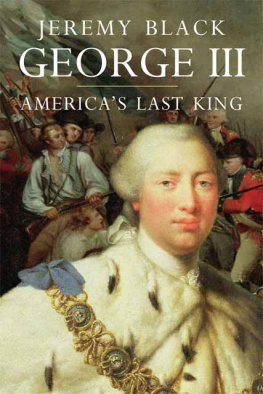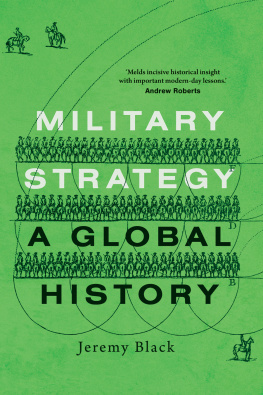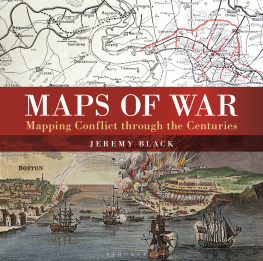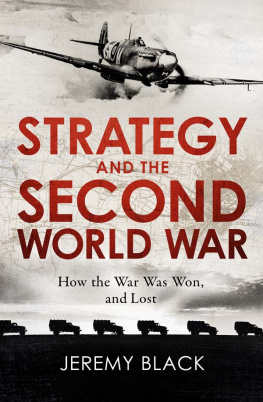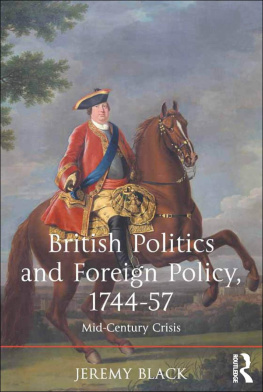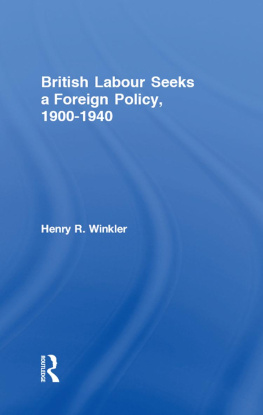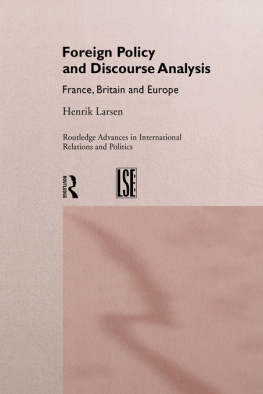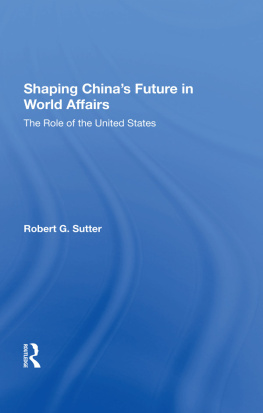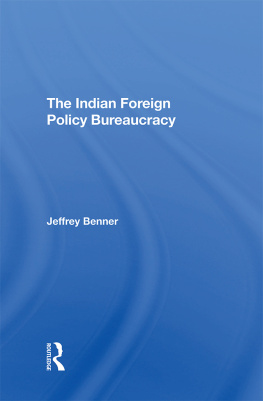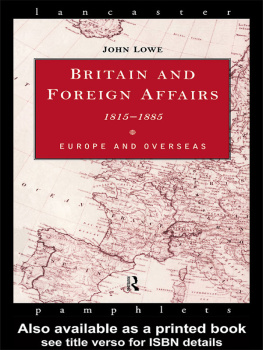DEBATING FOREIGN POLICY IN
EIGHTEENTH-CENTURY BRITAIN
For Gordon Marsden
Debating Foreign Policy in
Eighteenth-Century Britain
JEREMY BLACK
University of Exeter, UK
First published 2011 by Ashgate Publishing
Published 2016 by Routledge
2 Park Square, Milton Park, Abingdon, Oxon OX14 4RN
711 Third Avenue, New York, NY 10017, USA
Routledge is an imprint of the Taylor & Francis Group, an informa business
Copyright Jeremy Black 2011
Jeremy Black has asserted his right under the Copyright, Designs and Patents Act, 1988, to be identified as the author of this work.
All rights reserved. No part of this book may be reprinted or reproduced or utilised in any form or by any electronic, mechanical, or other means, now known or hereafter invented, including photocopying and recording, or in any information storage or retrieval system, without permission in writing from the publishers.
Notice:
Product or corporate names may be trademarks or registered trademarks, and are used only for identification and explanation without intent to infringe.
British Library Cataloguing in Publication Data
Black, Jeremy.
Debating foreign policy in eighteenth-century Britain.
1. Parliamentary practiceGreat BritainHistory18th century. 2. Communication in politicsGreat BritainHistory18th century. 3. Political cultureGreat BritainHistory18th century. 4. Great BritainForeign relations1689-1714. 5. Great BritainForeign relations17141837. 6. Great BritainForeign relations16891714Public opinion. 7. Great BritainForeign relations17141837Public opinion. 8. Public opinionGreat BritainHistory18th century. 9. Great BritainForeign relationsEurope. 10. EuropeForeign relationsGreat Britain.
I. Title
327.410409033dc22
Library of Congress Cataloging-in-Publication Data
Black, Jeremy.
Debating foreign policy in eighteenth-century Britain / Jeremy Black.
p. cm.
Includes bibliographical references and index.
ISBN 978-0-7546-5867-2 (hardcover : alk. paper) ISBN 978-1-3155-7602-2 (ebook) 1. Great BritainForeign relations18th century. 2. Public opinionGreat BritainHistory 18th century. I. Title.
DA480.B554 2011
327.41009033dc22
2010043381
ISBN 9780754658672 (hbk)
ISBN 9781315576022 (ebk-PDF)
ISBN 9781317154266 (ebk-ePUB)
Contents
Note on Dates, Spelling and Titles
The New Year is always taken as starting on 1 January. Until the reform of the calendar in 1752, Britain conformed to the Julian Calendar. Dates recorded in this calendar are referred to as old style and designated (os). All other dates are new style, the Gregorian calendar, which was eleven days ahead.
Spelling and punctuation have been modernised. Where possible, well-established anglicised forms have been used for both place and personal names. The length of noble titles and of titles of office has dictated their shortening. Place of publication is London unless otherwise indicated. Folio numbers are only given for foliated volumes.
Preface
The peculiar right of a free people is to write freely upon all subjects; to inspect the public conduct of those who have the care of our public affairs.
Old England, 11 February (os) 1744.
This book deals with one of the most important developments in history, the growth of Britain in the eighteenth century to become the great imperial power. The study focuses on the relationships between government policy and public debate about Britains role in the world, and considers policy in terms of the interlinked questions of foreign policy and strategy. This book builds on my earlier work in the field and takes it forward to provide a consideration of the nature of the debate and its impact on British policy. General themes are considered both in the long-term and with reference to particular periods that serve as an opportunity to clarify these themes. The long term was certainly one that contemporaries considered. Thanks to their education and reading, their historical memory went back to the Classics and included a good grasp of national history. In turn, their present became the history of their successors in a way that is less common today. Thus, in 1861, Lord John Russell, the Foreign Secretary, replied to pressure from Richard Cobden about what the latter saw as unnecessary government expenditure on the Royal Navy, by noting that French diplomatic approaches to Cobden reminded him of the French effort after the Peace of Ryswick of 1697 to encourage parliamentary opposition to the maintenance of a standing [permanent] army, something he had read about in Lord Macaulays History of England.
I have benefited from the comments of Jonathan Clark, Tony Claydon, Bill Gibson, Richard Harding, Thomas Otte, Andrew Thompson and an anonymous reader on an earlier draft of sections of this book and from their encouragement. None is responsible for any errors that remain. I would like to thank Her Majesty the Queen, the Duke of Northumberland, the late Marquess of Bute, the late Earl Waldegrave, and John Weston-Underwood for permission to work on papers in their possession. I am also grateful to the staff at Ashgate for their helpfulness during the production process, especially Tom Gray, Bethan Dixon and Albert Stewart.
It is a great pleasure to dedicate this book to a fellow historian who has followed a very different and far more distinguished path but whom I came to know as a first-rate editor of History Today, the editorial board of which I have been proud to serve for many years. Gordons commitment to public engagement with educational issues has remained strong and I am delighted to note our two decades of friendship.
Russell to Cobden, 2 Ap. 1861, NA. PRO. 30/22/32 fol. 120. For a Hesse-Cassel proposal in 1744 for the revival of the League of the Rhine of the 1650s, a French-led league of German princes opposed to the Austrians, memoire by Chavigny, French diplomat, 12 Jan. 1744, AE. CP. Bavire 109 fols. 634.
Prologue
Documentary Culture and the Historian
I am so incessantly occupied that I have not time to read newspapers, and I never see anybody except on business, so that I am not a good judge of public opinion.
Earl of Clarendon, 1856
George, 4 th Earl of Clarendon (180070), Foreign Secretary (18538, 186870) and a former diplomat, offered an instructive guide to the Foreign Office mind of the nineteenth century. This was an attitude that was generally disparaging about the public, and Clarendon went on to refer to Central American questions, including those of the Mosquito Coast of Nicaragua, then a British protectorate over which Britain and the USA were in dispute: the localities are as much unknown to John Bull [the quintessential Englishman] as the questions. He thinks that Central America is some region in the very heart of South or North America where cotton goods have not penetrated as for poor Mosquito he cannot divest himself of the idea of gnats [mosquitoes] which he would much sooner destroy than protect. We shall not get much support at home in any quarrel upon these matters.
The contrast between a knowledgeable professional stance and a feckless or ignorant public attitude is one that is well-established, and indeed was a contrast that resonated with longstanding social and political disdain for, and concern about, populism, concern that could also be found in pro-government publications through the eighteenth century. This book sets out to probe aspects of this apparent contrast and to do so for the eighteenth century, in order to throw light on political culture and foreign policy in this period. Aside from being a crucial period in Britains development as a great power, this age also saw the creation of a new system of public debate, with the lapse of the Licensing Act in 1695 and the growth of a large free press, providing unprecedented opportunities for explanation and debate. The resulting greatly-enlarged print culture has left much evidence for the discussion of information and opinion in the public sphere.


